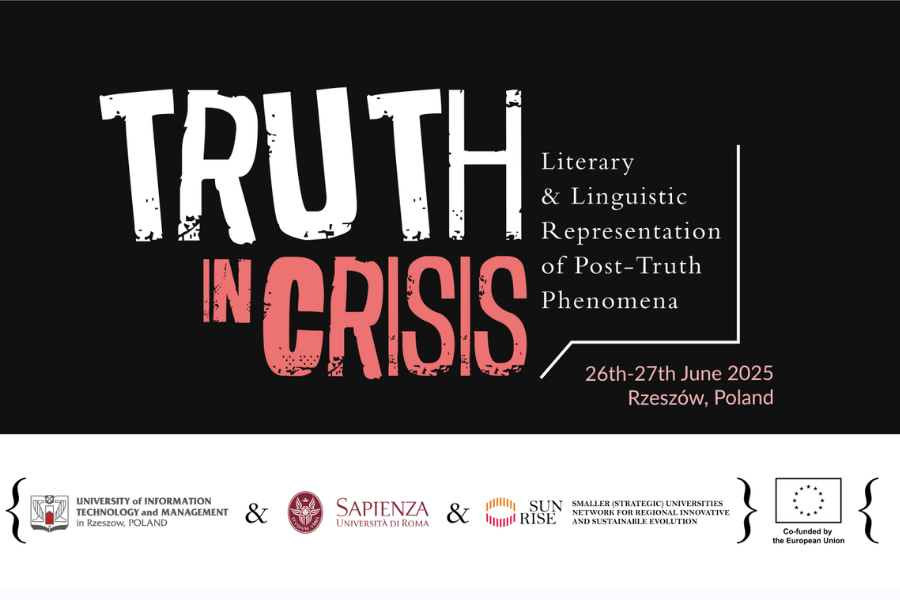Can we slow down the aging process? What are the trends in drug discovery? The answers to these questions and many more will be discussed during Dr. Martin Braddock’s lectures. The lectures will be held on March 25 and 26. We warmly invite you to join us during those two lectures.

Dr. Martin Braddock is an experienced scientific consultant with over 40 years of experience in the pharmaceutical and biotechnology industry. The founder of GENIXICONSULTING LTD, he specializes in consulting in the field of drug discovery and clinical development. He works with research organizations, biotechnology companies and universities, offering his knowledge from laboratory concept to commercialization. His experience covers all aspects of drug development, including validation of therapeutic targets, development of clinical plans and analysis of product positioning on the market.
Tuesday, March 25, 2025
9:30 am – 11:00 am Lecture as part of the Medical College Scientific Seminar: What has drug discovery ever done for us? KM8
12:00 pm – 1:30 pm Lecture: Recent Advances in Ageing Research – Can we Slow Down the Ageing Process? [KM8
4:30 – 6:00 pm Lecture: Trends for the Discovery of New Medicines -Main Lecture Hall, RA3
Wednesday, March 26, 2025
12:00 pm – 1.30 pm Lecture: The Science and Business of Discovering New Medicines KM8
1.45 pm – 3.15 pm Lecture: Recent Advances in Musculoskeletal Drug Discovery Future KM8
Martin Braddock, PhD, FRSB, FRAS is the founder and director of GENIXICONSULTING LTD, established in September 2024. He serves as a freelance independent scientific consultant, specializing in technological innovation, drug discovery, and clinical development, spanning from basic science to drug approval. Martin provides comprehensive scientific advice on all phases of drug discovery and development, from laboratory concepts to regulatory approval and subsequent commercialization. He collaborates with small, medium, and large biotechnology and biopharmaceutical companies, university departments, and research organizations within the United Kingdom and the European Union to contribute to the 'Science Behind the Business.’
With over 40 years of experience, Martin brings objective, pragmatic, and independent opinions, offering guidance for progressing drug candidates through clinical development. His expertise includes building basic pharmacology studies for target validation, delivering target product profiles, developing clinical development plans, and advising on product potential and positioning within current and future competitive environments.
Biography
Martin is an accomplished leader with extensive experience in managing projects, people, and scientific endeavours. His broad expertise in drug discovery, development, and project leadership spans over 40 projects, from basic concepts and target identification to phase III products and established marketed brands. He has held dual roles in science and project leadership for 41 years, including 29 years in drug discovery and development at AstraZeneca and GlaxoSmithKline, and 11 years in academic positions. Notably, he spent four years as a Royal Society University Research Fellow at Oxford University, where he secured his own research grant funding.
As a global drug development leader, Martin has led teams with input from across the EU, US, India, and China, focusing on new respiratory products and established marketed brands. He has secured multiple regulatory submissions, product approvals, and licence to operate maintenance activities for nine products/brands, supporting approximately $3 billion in sales revenue in 2023 and 2024. Martin’s expertise encompasses drug discovery from target identification to lead optimization across multiple therapeutic areas, as well as all aspects of early and late-stage clinical development, including life-cycle management. As a successful drug discovery project leader, he delivered eight compounds to candidate selection for first-in-man trials, progressing to phase IIb clinical development in various indications. He has contributed to projects in therapeutic areas such as metabolic diseases, cardiovascular, respiratory, inflammatory/autoimmune diseases, HIV and AIDS research, Alzheimer’s disease, and tissue repair and regeneration.
Martin has extensive line management experience at AstraZeneca and GlaxoSmithKline, where he served as Director of Discovery Bioscience and Disease Sciences Unit Head, respectively. He led large departments of up to 82 people, delivering biochemistry, pharmacology, and translational science to support the selection of 24 small molecule and four biological candidate drugs. Martin is recognized as a motivational leader and speaker, known for building and driving successful teams. He has established networks of academic collaborators, scientific, and clinical experts.
As an invited expert reviewer and advisor for multiple international grant-awarding bodies, Martin provides independent assessments of the Technical Readiness Level (TRL) status and evaluates the readiness for progression to the next TRL for over 300 proposals. He also serves as an independent program progress assessor, consensus meeting leader, and panel representative. Martin is the recipient of significant awards, including a Royal Society University Research Fellowship and an Alumnus Achievement Award for outstanding contributions to science. He is an elected Fellow of the Royal Society of Biology in recognition of his contributions to biological sciences, an invited Fellow of the Royal Society of Medicine, and an elected Fellow of the Royal Astronomical Society.
Lecture titles and abstracts
Introduction to drug discovery and drug development
Drug discovery and development is a complex, multidisciplinary process that involves identifying potential therapeutic new molecular entities (NMEs) and transforming them into safe and effective medications. The process begins with a theoretical concept which extends to target identification in the laboratory, where researchers identify biological molecules involved in disease. This is followed by lead NME discovery, optimization, and preclinical testing to assess safety and efficacy in laboratory models. Successful candidates then enter clinical trials, which progress through three phases to evaluate safety, dosage, and therapeutic effectiveness in human populations. Regulatory agencies, such as the FDA or EMA, rigorously review trial data before granting approval for public use. Despite advancements in computational modelling, high-throughput screening, and biotechnology, drug development remains costly and time-consuming, often taking over a decade and billions of dollars to bring a single drug to market. This introduction provides an overview of key stages, challenges, and innovations in drug discovery and development, highlighting its crucial role in modern medicine.
Drug discovery and development for musculoskeletal disease
Significant advances in drug discovery and development have transformed the treatment landscape for musculoskeletal diseases, including osteoporosis, osteoarthritis, and rheumatoid arthritis. Cutting-edge approaches such as high-throughput screening, artificial intelligence-driven drug design, and genomics have accelerated the identification of novel therapeutic targets. Biologic therapies, including monoclonal antibodies and gene-based treatments, have provided more precise and effective interventions by targeting inflammatory pathways and bone remodelling processes. Furthermore, advancements in regenerative medicine, such as stem cell therapy and tissue engineering, offer promising avenues for cartilage and bone repair. Personalized medicine, guided by biomarkers and patient-specific genetic profiling, is improving treatment outcomes by tailoring therapies to individual needs. Despite these breakthroughs, challenges such as high development costs, regulatory hurdles, and the complexity of musculoskeletal disorders persist. Ongoing research and technological innovations continue to drive progress, paving the way for safer and more effective treatments that enhance the quality of life for patients with musculoskeletal diseases.
Can we live longer? Drug discovery and development for anti-ageing
Recent advances in drug discovery and development have revolutionized the field of anti-aging therapies, targeting the biological mechanisms of aging to extend health span and lifespan. Innovative approaches, including senolytics, which selectively eliminate senescent cells, and caloric restriction mimetics, such as metformin and rapamycin, have shown promise in slowing age-related decline. Advances in genomics, artificial intelligence, and high-throughput screening have accelerated the identification of novel compounds that modulate key aging pathways, such as mTOR, AMPK, and sirtuins. Additionally, regenerative medicine strategies, including stem cell therapy and gene editing, are paving the way for rejuvenative treatments. NAD+ precursors and epigenetic reprogramming also offer potential to restore cellular function and combat age-related diseases. While significant challenges remain, including regulatory hurdles and long clinical trial timelines, these breakthroughs hold great promise for improving longevity and health span. Continued research and innovation are essential to translating these discoveries into safe and effective anti-aging therapies.
What are the new trends for drug discovery and development?
The landscape of drug discovery and development is rapidly evolving, driven by technological advancements and innovative approaches. Artificial intelligence (AI) and machine learning (ML) are revolutionizing drug design by accelerating target identification, lead optimization, and predictive analytics. Precision medicine, enabled by genomics and biomarker-based approaches, is tailoring treatments to individual patients for improved efficacy and reduced side effects. High-throughput screening and CRISPR-based gene editing are enhancing target validation and drug candidate selection. Additionally, biologics, such as monoclonal antibodies, gene therapies, and RNA-based drugs, are expanding treatment options beyond traditional small molecules. Automation, robotics, and digital twin technology are streamlining preclinical and clinical research, reducing development costs and timelines. Furthermore, regulatory innovations, such as adaptive trial designs, are facilitating faster approvals of breakthrough therapies. As these trends continue to evolve, they promise to enhance the efficiency, safety, and effectiveness of drug discovery, ultimately improving patient outcomes worldwide.
Seminar title and abstract
What has drug discovery ever done for us?
The return on investment (ROI) in drug discovery and development is a crucial factor driving pharmaceutical innovation, balancing high research costs with the potential for significant societal and economic benefits. Drug development is a lengthy and expensive process, often taking over a decade and costing billions of dollars. Despite these challenges, successful drugs yield substantial financial returns and profound public health impacts. For instance, statins, such as atorvastatin (Lipitor), revolutionized cardiovascular disease treatment, preventing millions of heart attacks and strokes while generating over $150 billion in revenue. Similarly, biologics like adalimumab (Humira) have transformed autoimmune disease management, becoming one of the best-selling drugs globally. The rapid development of COVID-19 vaccines, such as Pfizer-BioNTech’s mRNA vaccine, showcased the power of accelerated drug discovery, saving millions of lives while generating significant economic returns.
Advancements in artificial intelligence, genomics, and personalized medicine are further enhancing ROI by improving efficiency and reducing costs. Precision oncology drugs, such as pembrolizumab (Keytruda), offer targeted treatments with high efficacy, extending patient survival while becoming multi-billion-dollar assets. Despite high failure rates in early-stage research, the successful commercialization of groundbreaking therapies underscores the long-term value of pharmaceutical investments.
Beyond financial returns, the impact of successful drug discovery extends to increased life expectancy, reduced healthcare costs, and improved quality of life. Public-private partnerships, regulatory innovations, and AI-driven drug discovery are accelerating the path to market, making investment in pharmaceuticals increasingly attractive. While risks remain, the long-term benefits—both economic and societal—highlight the indispensable role of drug development in advancing global health. As technology and research methodologies continue to evolve, optimizing ROI will be essential to sustaining innovation and delivering transformative therapies to patients worldwide.






